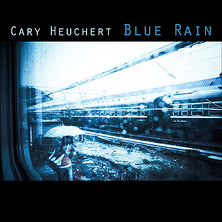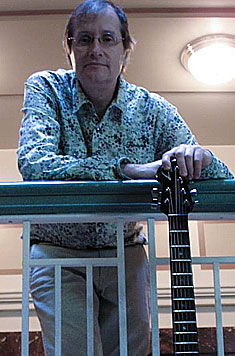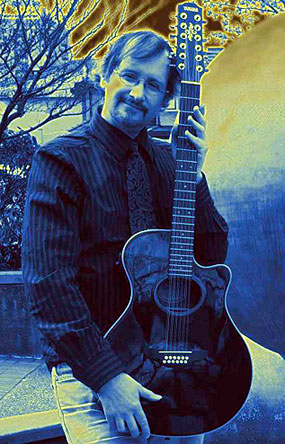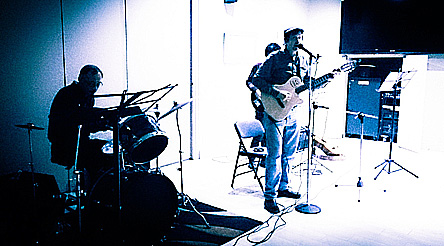 Vancouver
based singer-songwriter Cary Heuchert is well known on Facebook
for his keen insights into progressive rock history. Like many musicologists,
Cary is also a gifted recording artist in his own right. On his CD
debut, entitled Blue Rain, Cary Heuchert delves deep
into the archetypes of rock and pop music and provides a fascinating
assortment of folk-rock, psych-pop and progressive rock sounds of
his own design. Blue Rain is self-produced and, while it may
be more Emitt Rhodes than Paul McCartney, it’s Cary's songs that
will have you coming back for seconds and thirds. One track here called
“Maoershan” is very much in the Mike Pinder tradition of
mellotron styled instrumental music. Speaking to mwe3.com about the
wide variety of folk-rock meets progressive rock sounds on Blue
Rain, Cary explains, "Yes, it started off as folk-rock,
but in a progressive way, because I realized early that I wanted each
song to be a little different and show diversity. I've always admired
artists who were diverse. The Beatles perhaps started this trend and
opened the doors and inspired other groups like Pink Floyd, Spirit,
Traffic, Family and others. Bands which you couldn't classify so easily..."
The tracks on Blue Rain vary widely from track to track, but
there’s a cutting edge sounding early Traffic meets Nick Drake
kind of approach here. A very cool album by a rising artist with a
lot to offer, Cary Heuchert's Blue Rain is a fascinating look
and listen into the art of 21st century progressive music. www.OddiyoRecords.com
www.CDBaby.com
Vancouver
based singer-songwriter Cary Heuchert is well known on Facebook
for his keen insights into progressive rock history. Like many musicologists,
Cary is also a gifted recording artist in his own right. On his CD
debut, entitled Blue Rain, Cary Heuchert delves deep
into the archetypes of rock and pop music and provides a fascinating
assortment of folk-rock, psych-pop and progressive rock sounds of
his own design. Blue Rain is self-produced and, while it may
be more Emitt Rhodes than Paul McCartney, it’s Cary's songs that
will have you coming back for seconds and thirds. One track here called
“Maoershan” is very much in the Mike Pinder tradition of
mellotron styled instrumental music. Speaking to mwe3.com about the
wide variety of folk-rock meets progressive rock sounds on Blue
Rain, Cary explains, "Yes, it started off as folk-rock,
but in a progressive way, because I realized early that I wanted each
song to be a little different and show diversity. I've always admired
artists who were diverse. The Beatles perhaps started this trend and
opened the doors and inspired other groups like Pink Floyd, Spirit,
Traffic, Family and others. Bands which you couldn't classify so easily..."
The tracks on Blue Rain vary widely from track to track, but
there’s a cutting edge sounding early Traffic meets Nick Drake
kind of approach here. A very cool album by a rising artist with a
lot to offer, Cary Heuchert's Blue Rain is a fascinating look
and listen into the art of 21st century progressive music. www.OddiyoRecords.com
www.CDBaby.com
mwe3.com presents an interview
with
CARY HEUCHERT
 mwe3: Tell
us about life in Vancouver and where you’re from originally.
How has Vancouver changed over the years and what other cities in
Canada do you like?
mwe3: Tell
us about life in Vancouver and where you’re from originally.
How has Vancouver changed over the years and what other cities in
Canada do you like?
Cary Heuchert: Yes, I've been living in Vancouver for over
thirty years now. I came here in 1983, at the age of 21. The main
reason was to attend art college, but, I ended up staying long-term.
I guess I've become used to the laid-back lifestyle and mild weather
here. It's become a more prominent city internationally, due to the
2010 Winter Olympics, and more people are visiting here from abroad
than ever before, which is fine by me, because I've always been interested
in world culture and learning new languages. I'm originally from Saskatoon,
which is located in the Canadian prairies, a much smaller city, and
somewhat isolated, but a great place to be grow up. When I started
elementary school in the late 1960's, I became aware of the music
of Joni Mitchell, who also grew up in Saskatoon. The cover art she
did on her second album, Clouds from 1969, features the skyline
of Saskatoon.
mwe3: You’re so well known for your insightful Facebook
posts about music but not too many people know you for your own music.
How did Blue Rain come together as an album and when were the
songs written?
Cary Heuchert: I started writing material for the new album
in summer 2011, right after I had just completed recording my first
album, Nocturna And Other Stories, which was basically an experimental
and instrumental album. It included only one song with vocals called
“Sundown Morning”, which I was quite happy with, so I decided
to continue and write more lyric songs for this album, because I could
easily perform them live with just guitar accompaniment. The song
“Blue Rain” was the first one I wrote, which also set the
theme for the rest of the album.
mwe3: Where is Blue Rain coming from musically and stylistically?
Would you say it’s progressive folk-rock or a new kind of musical
genre for the 21st century? It’s very unusual and different sounding
which is what you tried to achieve right?
Cary Heuchert: Yes, it started off as folk-rock, but in a progressive
way, because I realized early, that I wanted each song to be a little
different and show diversity. I've always admired artists who were
diverse. The Beatles perhaps started this trend, and opened the doors
and inspired other groups like Pink Floyd, Spirit, Traffic, Family,
and others. Bands which you couldn't classify so easily.
 mwe3:
You recorded the music on your own. How did you sync it all up to
get a band-like effect on some of the tracks?
mwe3:
You recorded the music on your own. How did you sync it all up to
get a band-like effect on some of the tracks?
Cary Heuchert: Well, I played all the instruments myself. Each
song featured different instrumentation, which I multi-tracked and
played entirely in my studio. It's a long process, which is one reason
it took me nearly a year to get it all sounding the way I wanted.
mwe3: What era of music did you grow up in and what bands are
still your biggest influences. I know you told you’re about 52,
so that makes you how old when Sgt. Pepper’s came out?
Cary Heuchert: The first music I remember was what I heard
on AM radio from the mid-1960s onward, the psychedelic era, which
had a great affect on me: The Beatles, Moody Blues, Procol Harum,
The Doors, Jefferson Airplane, Steppenwolf, and other bands. Even
though I was only 5 in 1967, when Sgt. Pepper came out, I can
remember seeing album art in record stores, and psychedelic art in
comic books I was reading. So, the late 1960's influenced me greatly,
especially because it was also a time of social change. My art teacher
in grade 3 was really cool. She had posters and album covers of Hendrix,
Cream, Beatles, and Dylan on her walls in the classroom. She was an
early mentor to me with my art, and supported me and helped develop
my drawing and artistic skills.
By 1973, I started to collect records, and later, progressive rock,
jazz, and folk music had a big affect on me. As a visual artist, I
loved both not only the music, but album artwork as well. I began
to study classical guitar in high school in 1978, and learned a few
fingerstyle techniques from a Chet Atkins guitar book I'd bought.
Soon after graduation in 1980, I purchased an open reel machine and
began recording my own compositions for the first time, playing electric
guitar and bass with friends. Artists like Jack Bruce, Pink Floyd,
Nick Drake, Soft Machine, Free, Jade Warrior, Moody Blues, Pentangle,
Steve Howe, Alan Hull, Joni Mitchell, Roy Harper, Jim Pembroke, Mike
Oldfield, Bridget St. John and others would continue to influence
me as a songwriter and musician. To this day, however, I still return
to the Beatles work. Perhaps because they were the first rock group
I remember as a child. For inspiration, John Lennon's solo work, was
always huge for me.
mwe3: What decade of music is the most influential in your
opinion? There’s always that stark contrast between the mid 1960’s
and early ‘70s. It sometimes feels like nothing has really advanced
past that 15 to 20 year time frame.
 Cary
Heuchert: It's difficult to say, but, in my opinion, it could
ultimately be the 1970s, because during that decade, everything seemed
to be going on simultaneously. I can remember nearly all music was
classified as 'rock' at that time. No borders and no limits to what
the imagination could do. I believe today, there is a lot of great
music being made, but, it's now beyond the mainstream, and we need
to search more to discover it.
Cary
Heuchert: It's difficult to say, but, in my opinion, it could
ultimately be the 1970s, because during that decade, everything seemed
to be going on simultaneously. I can remember nearly all music was
classified as 'rock' at that time. No borders and no limits to what
the imagination could do. I believe today, there is a lot of great
music being made, but, it's now beyond the mainstream, and we need
to search more to discover it.
mwe3: So tell us about why you call your new album Blue
Rain. What can you tell us about the title track which starts
off the album? It’s a great mood setter but the subject matter
is rather blue. What’s the metaphor with the rain? What instruments
are you playing on that track and how did you combine the guitar and
guitar synthesizer?
Cary Heuchert: On the title track, “Blue Rain” I
play acoustic 12-string, which I've always loved the sound of. Also
I use a Roland guitar synthesizer for harmony, and fretless bass.
I decided not to play drums on the song, to retain a stark, empty
feeling. This song is essentially a 'good-bye' song, which was inspired
by a real experience of having to part ways with someone who had been
close to me. I expected to see her again, but, in fact, we never did
again. The metaphor for rain of course, is tears. As I looked out
the plane window, the rain suddenly began to fall from the sky which,
simultaneously reflected my own true feelings of sadness at that moment
in time.
mwe3: Is track two, “Every Morning Comes” kind of
a protest song? I can picture Phil Ochs or Buzzy Linhart singing it!
It has a definite kind of 1960s flavored sound. Tell us how you came
upon the mellotron and did you use a real ‘tron or a computerized
patch on the album?
Cary Heuchert: “Every Morning Comes” is actually
a Zen song, about trying to live and focus on the present day, and
having a new life begin every morning when we wake from our sleep.
This concept makes me appreciate each day more. It doesn't matter
if it's a Monday or Saturday, each day is a new opportunity for each
of us. I played a nylon-string guitar on this track and using a Mellotron
M3000 program, with the iPad connected to an Akai Synthstation 49
keyboard controller. Apparently, this is what King Crimson now uses
instead of a real mellotron. Actually, once I played a white mellotron
M400 back in 1993. Someone was selling it locally at the time, but,
I couldn't afford to buy it then, let alone now. I love them though.
 mwe3:
Track three “The Girl Of Dreams” has a kind of early ‘60s
sound with an Indian beat. You used a couple strange instruments here
including the tabla and the oud. Tell us something about that combination
of exotic instrumentation and that track.
mwe3:
Track three “The Girl Of Dreams” has a kind of early ‘60s
sound with an Indian beat. You used a couple strange instruments here
including the tabla and the oud. Tell us something about that combination
of exotic instrumentation and that track.
Cary Heuchert: This is a fantasy song, about a girl who comes
to visit your dreams at night, but, never reveals who she is. When
I first wrote this song, I intended to record it in a kind of 1960's
Kinks or Who British rock style, but, after I bought a Godin Multi-Oud,
which is a modern amplified version of the traditional Oud, an 11-stringed
fretless instrument, I decided to use it instead because of the exotic
nature and fantasy element of the song. The tablas were played via
midi to my drum kit. Perhaps it would work well in a Bollywood film...
mwe3: Track four, “Rainfall” gets back to the rain
imagery in the Blue Rain album. Do you love rain and how does
it impact your music? The song is a great rain tribute and has a definite
kind of mid 1960s Stones-type melody or is that a Kinks type image?
A definite highlight of the Blue Rain CD.
Cary Heuchert: Yes, “Rainfall” keeps to the theme
of the album. It's probably my favorite song on the album. No, I don't
love rain, but, I find it refreshing sometimes. Especially living
on the west coast in Vancouver, sometimes referred to by locals, as
“Raincouver”, so the air is always fresh here. This song
is actually an optimistic song about the rain. On a clear sunny day,
we tend to go out and enjoy our life, but, on a rainy day, we may
be forced to stay indoors and have an opportunity to think about our
life. From the rain we can see the light, and reflect on our own past
or future paths. I decided to use my Epiphone electric double-neck
12-string on this track and to my surprise, it provided a real Byrds-like
feel to the song. A band which I've always liked. After including
bass and the drum kit, the song came to life even more, finally adding
a touch of tambourine.
mwe3: Track 5 “Winterlude” is keyboard dominated.
Just a brilliant moment. Sounds like you thrive on on frozen dreams
from another time! I guess I’ve been in Florida too long. Empty
skies and bare trees... nice! The fretless bass makes a big difference
in the sound.
Cary Heuchert: I'm glad you like it. Yes, it's another reflective
song. “Winterlude” is about waiting for spring to come and
welcoming it after a long cold winter. I grew up in Saskatchewan,
so, I'm familiar with how long the seemingly endless winter can be.
Yes, I'm pleased how this track turned out.
 mwe3:
“Not Just Another Day” has a fake intro! You should do an
edit and have the fast start. Great melody. Is it Bowie esque? Is
every day special? Why do we only remember only some days? Good or
bad right? There’s kind of 3 parts to that song, the acoustic
interludes, and the driving guitar parts. Tell us about that solo
you take before the last chorus. Life goes on...
mwe3:
“Not Just Another Day” has a fake intro! You should do an
edit and have the fast start. Great melody. Is it Bowie esque? Is
every day special? Why do we only remember only some days? Good or
bad right? There’s kind of 3 parts to that song, the acoustic
interludes, and the driving guitar parts. Tell us about that solo
you take before the last chorus. Life goes on...
Cary Heuchert: Yes, I believe it. Everyday is special, and
it's up to us to value time more. My father used to tell me when I
was younger, that once a day is gone, it never comes again, and that
was the idea of this song. When we're younger we tend to let days
pass by, and take time for granted, but, as we get older, each day
should take on more meaning. This is the longest track on the album,
and came together by combining two song ideas which I had written.
One was the instrumental acoustic guitar and drums intro/mid/outro,
a kind of “going back to the country” sound, perhaps influenced
by The Band or something. The electric guitar solo was mic-ed live
with a Roland Space Echo, using the 6 string of my Epiphone double-neck
12/6 string.
mwe3: But of course rock instro prog fans will love track seven
“Maoershan”. What does it translate to and in what language?
With the ‘tron on high, it does have a kind of Mike Pinder influence.
Was Mike Pinder the most important character in U.K. music after Lennon
in your opinion? Good to see Moodies fans still carrying the Pinder
theories of music. How did you record “Maoershan”? Mellotron
first? More instrumentals coming?
Cary Heuchert: I actually wrote this song when I was living
in Northeastern China, back in 2005-06. I taught English there for
one year, and bought an acoustic guitar, which I'd often bring to
school and teach students English songs with. “Maoershan”
is the Mandarin Chinese name for a mountain in Heilongjiang province.
Every time I took the bus on the highway to the city of Harbin, I
would pass by a somewhat strange looking mountain. It's called “Maoershan”
because it looks like a hat, so, in English, it would be called Hat
Mountain.
My original idea was to record this song with guitar, but, then decided
for a change of pace to the album, and feature mellotron on it instead.
Perhaps in the tradition of the Moodies track “Beyond” or
The Beatles “Flying”. I've always loved what Mike Pinder
started and contributed to progressive rock music, influencing so
many bands that followed in the Moody Blues footsteps like King Crimson,
Gracious, Spring, Barclay James Harvest and others.
 mwe3:
Track eight “Lost In Your Dream” has another kind of Moody
Blues sound. And of course, the “Blue Rain” title echoes
in “Lost In Your Dream”. Another sad song!
mwe3:
Track eight “Lost In Your Dream” has another kind of Moody
Blues sound. And of course, the “Blue Rain” title echoes
in “Lost In Your Dream”. Another sad song!
Cary Heuchert: You're right, “Lost In Your Dream”
is a direct response to “Blue Rain”, but this song is told
in the second person perspective, perhaps giving advice to someone,
but, it's already too late. It's symphonic rock, like the Moody Blues
or early Electric Light Orchestra. I've always liked that kind of
sound.
mwe3: “Someday” is kind of an optimistic song. Is
that the most straight ahead folk song on the album? I like the last
chorus as it’s optimistic, with hope in mind. Are hopeful songs
easier to write than sad, and deep songs?
Cary Heuchert: Yes, it was the most folk-oriented song on this
album. It was just 6-string acoustic guitar and vocals. It was recorded
in one session, actually, unlike others that took up to a week or
more to do. “Someday” is a song expressing disappointment,
in the breaking of a promise that all of us tend to make, at one time
or another. It's quite common we tell others that we will spend time
with them 'someday', 'sometime', or 'next time'; but, it may never
happen. In the end, only a true person will follow through for you
and keep their word. The last verse suggests that we should spare
time with others before it's too late.
I think sad songs are actually easier to write for me, perhaps because
of the deep feeling they can provide, yet every song I write usually
has a ray of hope in it. I always keep optimistic regardless. After
all, if we have hope, we have life.
mwe3: I thought the album should have ended with “Someday”
but you pull a fast one and end it with “Ode To The Sun”.
It’s such an odd sounding song! Lovin’ Spoonful meets Hurricane
Smith? There’s a number of instruments on that including guitalele
and mandolin. Also the 'Tron reappears and you’re playing real
drums? Being from Canada and after all that rain, it’s nice to
have an “Ode To The Sun”!
Cary Heuchert: I wanted to end the album on an optimistic note,
and there's nothing that makes most of us more happy than to wake
up to a sunny day. My original concept was to include as many 'cheerful'
instruments as possible: banjo, kazoo, accordion, but, it became enough.
The Mellotron brass and organ provided a contrast in the second half
of the song. Yes, real drums too. I did that in one take... surprisingly.
(lol)
mwe3: Tell us about the Blue Rain cover art. Is the
girl on the cover someone you know? Are you planning a vinyl pressing?
Be cool to see this artwork as a large Lp. I just got a vinyl pressing
with a CD included!
 Cary
Heuchert: I took the photograph when I was traveling in southern
China, while waiting inside a train to leave the station. It was during
the ultra-rainy summer season, and the rain would sometimes begin
pouring heavily without any warning. A girl with an umbrella appeared
and passed by the window, and I managed to capture the moment. I didn't
know who she was, but, I am fortunate to have this image now for my
album cover. Whoever you are... Xie xie ni (thank you). Yes, I'm planning
to release “Blue Rain” as an LP on 'blue vinyl', hopefully...
Cary
Heuchert: I took the photograph when I was traveling in southern
China, while waiting inside a train to leave the station. It was during
the ultra-rainy summer season, and the rain would sometimes begin
pouring heavily without any warning. A girl with an umbrella appeared
and passed by the window, and I managed to capture the moment. I didn't
know who she was, but, I am fortunate to have this image now for my
album cover. Whoever you are... Xie xie ni (thank you). Yes, I'm planning
to release “Blue Rain” as an LP on 'blue vinyl', hopefully...
mwe3: Tell us about your work in Vancouver as a language instructor.
What other languages do you speak and how do you balance your work
with your music career?
Cary Heuchert: I've been teaching English since 2005. Before
that, I was a professional photographer for 11 years. I still love
doing photography, but, for everyday work I enjoy teaching English,
and giving people some confidence to make their lives easier to live
in Canada. When I lived in Harbin, China, I was helped by many local
people there. I needed to speak Mandarin everyday, and by just learning
to speak some words from another country's language you get respected
by the local people, and it begins to open new doors for you. Art
and music are also universal languages, and ideal ways to connect
with another country's culture. I try to always make time for any
creative projects, and usually play the guitar or practice drums everyday.
mwe3: I like the name of your label Oddiyo. Is that Japanese
for Audio? I just thought of that! (lol)
Cary Heuchert: It's just a pun!
mwe3: How would you compare Blue Rain with your other
albums? And do you think it’s your best album yet? What are you
planning for 2015? Do you have a lot of songs that you want to record
and/or are you always writing music?
 Cary
Heuchert: I consider Blue Rain my first real album, even
though it’s my second release. I'm pleased with the way it turned
out, and the flow of the album. I'm also planning to remix and remaster
my first album, Nocturna And Other Stories during this year.
As I've finally learned to play drums during the past year, I plan
to add drums to a few of those songs, which will change the dynamics.
Yes, I already have musical ideas coming together for the next one,
which I will begin recording later in 2015. Songs can come together
quite quickly, it all depends on inspiration. Thanks to the "blue
rain" of Vancouver for the extra inspiration on this album, without
it, things could have turned out a bit sunnier!
Cary
Heuchert: I consider Blue Rain my first real album, even
though it’s my second release. I'm pleased with the way it turned
out, and the flow of the album. I'm also planning to remix and remaster
my first album, Nocturna And Other Stories during this year.
As I've finally learned to play drums during the past year, I plan
to add drums to a few of those songs, which will change the dynamics.
Yes, I already have musical ideas coming together for the next one,
which I will begin recording later in 2015. Songs can come together
quite quickly, it all depends on inspiration. Thanks to the "blue
rain" of Vancouver for the extra inspiration on this album, without
it, things could have turned out a bit sunnier!



